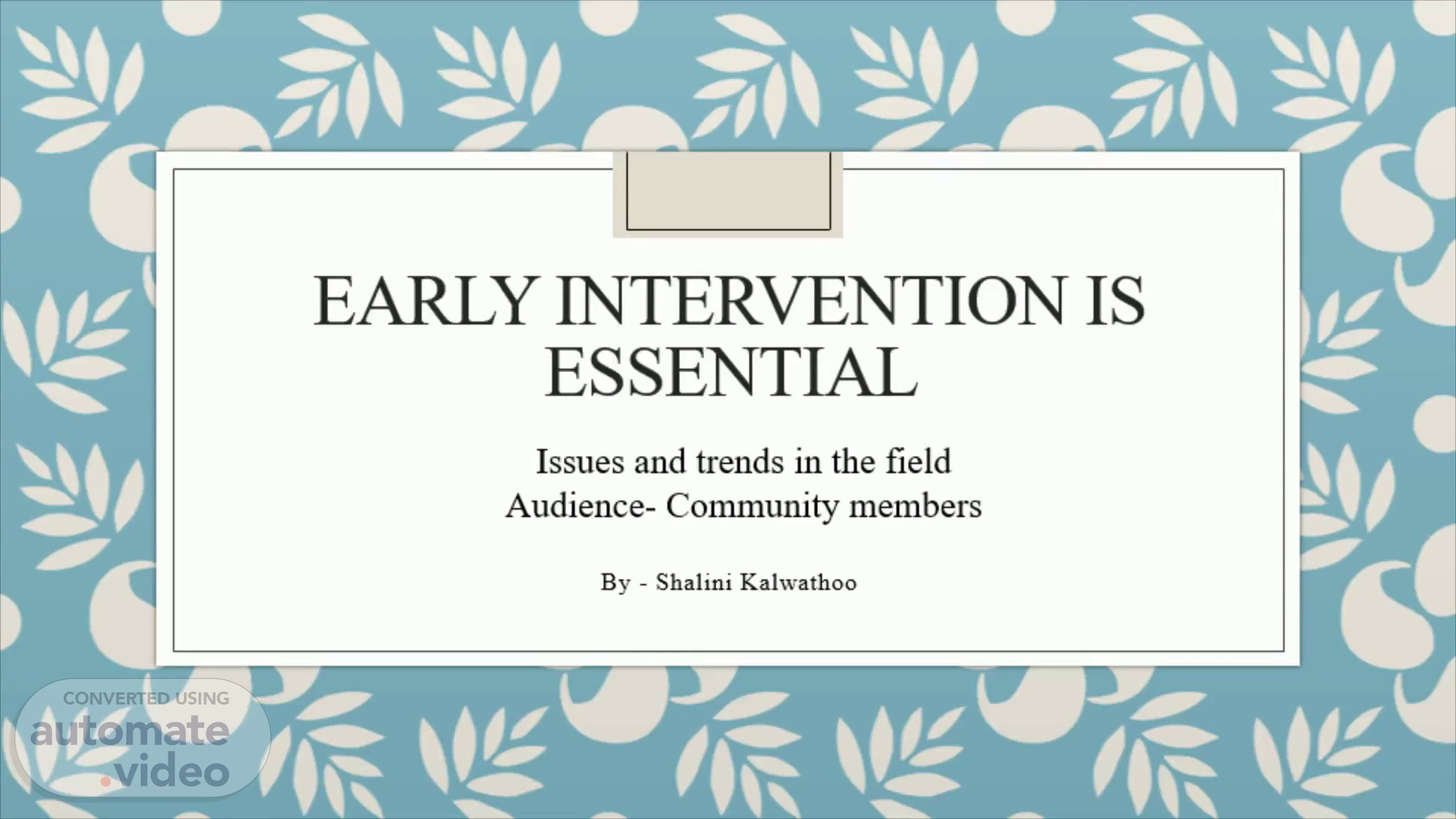
Page 1 (0s)
Early Intervention is Essential. By - Shalini Kalwathoo.
Page 2 (9s)
Introduction. Early intervention is essential for children with developmental problems since it gives guidelines on supporting the child and family. This is specialized support given to children with disabilities such as developmental delays, autism, and other additional needs that they may develop. The early intervention should be done immediately as soon as the child's needs have been identified..
Page 3 (32s)
Early intervention Readiness. The intervention can be done in terms of therapies, or education, or any other support that can help the child and the family. It is the best way to support the well-being and development of children with a disability, developmental delays, and autism. It helps children to develop the skills they need to take part in their daily activities. Such children who have access to early intervention need no or less support at their older age..
Page 4 (1m 1s)
This focuses more on the brains and bodies. This ensures that the child's brain development is as required, and they can process information and give it meaning using their brains ( Fontil et al., 2019). The body is also focused on when they undergo therapies to ensure that their body parts can function as required..
Page 5 (1m 25s)
Cognitive development. Focuses majorly on learning and thinking . Learning goes hand in hand with thinking. Once the child's thinking capacity is developed, it becomes easy for them to read content and analyze it, which results in a conclusion that the learning process has taken place..
Page 6 (1m 45s)
Behavioral development. Once a child undergoes early intervention, their behavior is checked and trimmed in the right direction. The behavior of a child affects their cognitive and physical development ( Fontil et al., 2019). Therefore, it needs to be checked at early stages, mainly after birth, to ensure that the child grows up with behaviors that support their development..
Page 7 (2m 7s)
Emotional and social development. A child that undergoes early intervention can form and cope with relationships, whether they are toxic or good ones (Pasco, 2018). This is because they are trained on how to cope with their emotions as well as control them. A child's emotions affect their cognitive and physical development due to relations that they create and maintain..
Page 8 (2m 31s)
Early intervention Benefits. Early intervention lays a foundation to improve lives and offer more significant opportunities to the child. Once the support system realizes the child's abilities, they can offer them opportunities for self-advancement and development at the later stages of life. Early intervention is forward-looking, even in the case of adulthood. For instance, the support system goes far more than providing the child with immediate benefits when a child goes through EI therapies (Pasco, 2018). They substantially increase the ability of the child to integrate into future social environments such as community, schools, and employment..
Page 9 (3m 47s)
Early intervention provides the child with support and assistance that empowers their families. The families can get financial support to help raise the children and get sponsorships to cater to the child's needs, which relieves that family from the financial burden that is brought by the developmental problems (Csillag et al., 2018). Some of the families experience stress and frustration, helplessness. Therefore, early intervention helps in building a supportive and nurturing environment for the entire family. Early intervention promotes future success in school. Communication development influences the later success of a student in school as it sets the literacy stage (Cannon, 2021). This suggests that a child who goes through early intervention has good language command, which goes hand in hand with creating ideas and imagining, then eventually results in reading and writing..
Page 10 (5m 38s)
Conclusion. Early intervention is essential since it touches on every aspect of the child's development and helps them in the future due to the opportunities provided. With early intervention, all aspects, including physical, cognitive, social and emotional, and behavioral development, are touched to bring change in the present and future life of the child..
Page 11 (5m 58s)
References. Cannon, T. D. (2021). Do the Benefits of Early Intervention Services for Psychosis Generalize and Persist in the Real World?. Csillag , C., Nordentoft , M., Mizuno, M., McDaid, D., Arango , C., Smith, J., ... & Jones, P. B. (2018). Early intervention in psychosis: From clinical intervention to health system implementation. Early Intervention in Psychiatry , 12 (4), 757-764. Fontil , L., Sladeczek , I. E., Gittens , J., Kubishyn , N., & Habib, K. (2019). From early intervention to elementary school: A survey of transition support practices for children with autism spectrum disorders. Research in developmental disabilities , 88 , 30-41. Pasco, G. (2018). The value of early intervention for children with autism. Paediatrics and Child Health , 28 (8), 364-367..